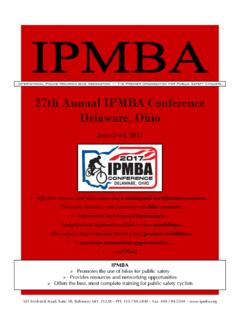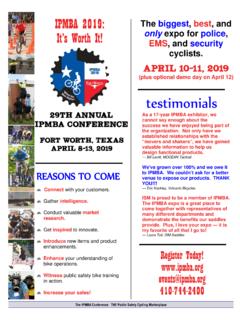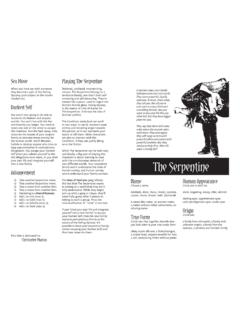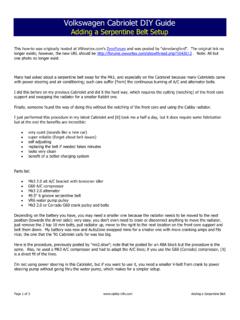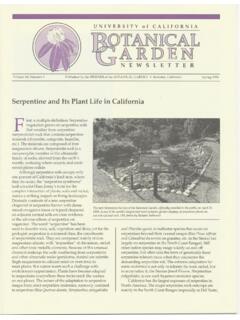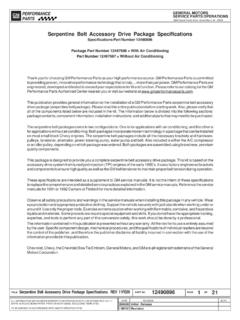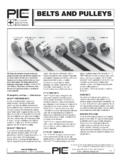Transcription of IPMBA 410-744-2400 www.ipmba
1 IPMBA 583 Frederick Road, Suite 5B, Baltimore MD 21228 410-744-2400 Thank you for your interest in the IPMBA Instructor Course. This document contains the following to familiarize you to the IPMBA curriculum: IPMBA Instructor Course Syllabus: this is the student syllabus for the Instructor Course. IPMBA Instructor Course Mandatory Materials & Equipment Checklist: this provides a list of material and equipment generally required of all students enrolling in the IPMBA Instructor Course. IPMBA Unit Plans: this contains Unit Plans for each unit of instruction comprising the IPMBA Instructor Course. Please contact IPMBA at , or 410-744-2400 with questions, more information, or for assistance in locating an IPMBA Instructor Course.
2 IPMBA promotes the use of bikes for public safety, provides resources and networking opportunities, and offers the best, most complete training for public safety cyclists. Revision Date: April 7, 2013 Page 1 2013 International Police Mountain Bike Association 410-744-2400 Fax 410-744-5504 IPMBA Instructor Course Syllabus Day One: 0800 1800 Hours Welcome, Introductions and Guidelines The class will begin with a welcome and both instructor and student introductions. The guidelines, safety rules, and course expectations will be provided. All course paperwork will be completed during this period. Break Basic Knowledge Written Test The 50-question basic knowledge written test will be administered.
3 Each student must score at least 90% on the test. Those who do not achieve the necessary score during this period will have one additional chance, on Day Two. Any student who does not score at least 90% on the second attempt will not be permitted to continue in the course. Upon completion, each student will proceed to the designated station to receive his/her oral presentation topics, skill station topics, and supporting materials. Break Basic Cyclist Course Theory This unit of instruction introduces students to the foundation and curricula of the IPMBA Public Safety Cyclist (PC/EMSC/SC) Courses. The student will become familiar with the elements of the courses and the topics that comprise each element.
4 Theories of Instruction and Adult Learning This unit of instruction addresses the established theories and principles of adult learning and instruction, particularly as they apply to the instruction of the IPMBA Public Safety Cycling Courses. Revision Date: April 7, 2013 Page 2 2013 International Police Mountain Bike Association 410-744-2400 Fax 410-744-5504 Lunch Written Test Review Instructor Trainers will conduct a review of the written test. Those individuals who missed questions will research the correct answers, and those that achieved 100% will begin studying the supporting material for Basic Maintenance and Safety Procedures during the review. Helmet Fit/ABC Quick Check Instructor Trainers will demonstrate the proper way to conduct the Helmet Fit and ABC Quick Check Skill Stations.
5 Students will make any necessary adjustments to their own helmets and perform the ABC Quick Check on their own bicycles prior to beginning the Basic Skills Testing process. Cone Courses/Basic Skills Testing Instructor Trainers will formally evaluate each instructor-candidate s on-bike skills. The following skills must be performed at an instructor level.* 4 Lock-to-Lock, 4 Offset Serpentine and 9 Slow Box Curb Ascent (Lofting Method) Curb Descent (Controlled Method) Stair Ascent (Police/Security: three minimum, Lofting Method; EMS: six minimum; Carry Method) Stair Descent (EMS - Controlled Method) (six minimum) *Instructor level is defined as successfully completing each maneuver while demonstrating balance, stamina, and smooth, flawless technique.
6 Students must attain a satisfactory rating within three attempts. Those who do not achieve a satisfactory rating during this period will have one additional chance, on Day Two. Any student who does not succeed during the second testing period will not be permitted to continue in the course. Skill Station: Basic Maintenance and Safety Procedures Part 1 Working within their assigned groups, students will take turns demonstrating (at an instructor level) their assigned maintenance skill(s) and teaching them to the other members of their group. Skills to be covered in this section are: Tire Change Bike Fit Procedure Bar End Angles Revision Date: April 7, 2013 Page 3 2013 International Police Mountain Bike Association 410-744-2400 Fax 410-744-5504 Brakes o Rule of Thumb o Brake Lever Angles o Brake Pad Alignment Cable Barrel Adjustments for Brakes and Shifters Students will be evaluated on their ability to teach their assigned skill(s) and perform the skills taught by the other members of their group.
7 Their performance will be documented by the Instructor Trainer on the Skills Proficiency Record. The students must achieve a proficient rating on those skills in order to pass the course. Day Two: 0800-1800 Hours The Delivery This unit of instruction introduces the concepts of class structure and organization, and identifies various methods to communicate educational material to students. Presentation tips that improve delivery and enhance presentation skills are included. Break Instructional Aids and the Classroom Environment This unit of instruction describes the various types of audio-visual and other instructional aids and how they can be utilized to maximize the adult learning process. Tips for the effective use of the most common instructional aids are included.
8 Breakout Sessions: Police & Armed Security/EMS Firearms Training for Bike Officers (Police & Armed Security): This unit of instruction discusses the importance of bicycle-specific firearms training. Topics include developing and implementing a course of fire, training and qualification standards, weapon manipulation, safety procedures, and tactical issues, including shooting from a moving bicycle. EMS Load Placement and Scene Safety: This unit of instruction addresses such topics as approaching the scene, bicycle positioning, scene safety, defensive measures, and the proper placement of equipment on the bicycle. Lunch Skill Station: Constructing the Cone Course This exercise will introduce the students to the efficient method and effective design of the IPMBA standardized cone obstacle course.
9 Students will learn how to measure and set up the cone patterns properly and how to use it to demonstrate slow speed skills to their students. Revision Date: April 7, 2013 Page 4 2013 International Police Mountain Bike Association 410-744-2400 Fax 410-744-5504 Skill Station: Teaching Basic Bike Handling Skills Part 1 Working within their assigned groups, students will take turns demonstrating (at an instructor level) their assigned on-bike skill(s) and teaching them to the other members of their group. Skills to be covered in this section are: Toe Clips Shifting and Gear Use Rolling Crossover Dismount (Police/Security only) Sprint, Response, Pursuit (Police/Security only) Maximum Braking Rear Scan Rock Dodge Quick Turns Hook (Power) Slide (Police/Security only) Cone Courses o 9 Slow Box, o 5 Lock to Lock, o 5 Offset Serpentine Curb Ascents o 90 degree Compression and Lift Lofting Method o Angled Stair Ascent o PC/SC: Lofting Method, three stairs o EMS: Carry Method, six stairs Stair Descent (Controlled Method) Skill Station.
10 Basic Maintenance and Safety Procedures Part 2 Students will be evaluated on their ability to teach their assigned skill(s) and perform the skills taught by the other members of their group. Their performance will be documented by the Instructor Trainer on the Skills Proficiency Record. The students must achieve a proficient rating on those skills in order to pass the course. Working within their assigned groups, students will take turns demonstrating (at an instructor level) their assigned maintenance skill(s) and teaching them to the other members of their group. Skills to be covered in this section are: Tire Change Bike Fit Procedure Bar End Angles Revision Date: April 7, 2013 Page 5 2013 International Police Mountain Bike Association 410-744-2400 Fax 410-744-5504 Brakes o Rule of Thumb o Brake Lever Angles o Brake Pad Alignment Cable Barrel Adjustments for Brakes and Shifters Students will be evaluated on their ability to teach their assigned skill(s) and perform the skills taught by the other members of their group.
